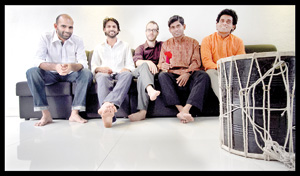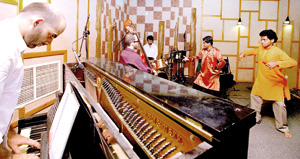Fresh vision for Sri Lankan musicology
There is a not-so-new band in town that is now going global with the sounds of Sri Lanka’s original spirituality. The Baliphonics, a collaboration between jazz musicians and traditional practitioners of the bali ritual, are doing something controversial. But as with most things that make people uncomfortable, they just might be breaking through to another frontier for Sri Lankan music.
 Baliphonics began in 2007 when Sumudi Suraweera began his PhD work on Sri Lankan low-country traditional drumming. He worked closely with well-respected bali practitioners from Raigama, Daniel Rupathilaka and his two sons, Prasantha and Susantha, over a number of years, during which he studied their ritual performances.
Baliphonics began in 2007 when Sumudi Suraweera began his PhD work on Sri Lankan low-country traditional drumming. He worked closely with well-respected bali practitioners from Raigama, Daniel Rupathilaka and his two sons, Prasantha and Susantha, over a number of years, during which he studied their ritual performances.
The fact that stood out to him was that the ritual was dying, and with it, the music.“In 2005, they performed around three rituals a month,” Suraweera explains, “but now it’s down to something like one ritual every three months.” Initially, Suraweera was only interested in studying the music of the bali. He “had no intention of doing what [they] are doing now”. But when he tried to learn the traditional bera, he realised that he could “get to the bottom of that language much quicker” on his own drum kit than on the traditional drums. And so, over the years, there grew what Suraweera calls “a natural kind of collaboration” between the two parties. And in this, there seemed to be a partial solution to the problem of the bali.
“There is no space in the current context to develop the rituals, they have basically died out,” Suraweera says. “I can’t keep the ritual alive, so we’re trying to keep the music alive.” What Baliphonics does is take the music out of the ritual context, and present it to a different audience via contemporary improvisation, modern jazz and Sound Art. Sumudi Suraweera provides the backbone for the music with his adaptations of the ritual drumming on his drum kit, while Isaac Smith and Eshantha Pieris supply tonal backing on double bass and piano.
 Prasantha and Susantha Rupathilaka vocalise, with only structural modification (to reduce the length of the performance from the span of a night to that of around an hour), the traditional chants which have been recited in their family for generations.While the concept of collaboration is not itself novel to Sri Lanka, the commitment of the performers is. Baliphonics functions with an awareness of “trying to keep the essence [of the bali] alive”, and this means that the modern elements of performance must only facilitate and support, not override, the traditional. Suraweera, Pieris and Smith are at all times led by the vocalists – a hard piece of work considering they must change speed, rhythm and even pitch centres, impromptu, as Prasantha and Susantha do.
Prasantha and Susantha Rupathilaka vocalise, with only structural modification (to reduce the length of the performance from the span of a night to that of around an hour), the traditional chants which have been recited in their family for generations.While the concept of collaboration is not itself novel to Sri Lanka, the commitment of the performers is. Baliphonics functions with an awareness of “trying to keep the essence [of the bali] alive”, and this means that the modern elements of performance must only facilitate and support, not override, the traditional. Suraweera, Pieris and Smith are at all times led by the vocalists – a hard piece of work considering they must change speed, rhythm and even pitch centres, impromptu, as Prasantha and Susantha do.
Baliphonics has over the years evolved into an art form which, as Suraweera sees it, “makes more musical sense than ritual sense”. This fact, though it may be key to preserving and developing at least one aspect of the bali ritual, has generated much criticism for the group, especially the two ritual practitioners. But while there may be some truth to the claims of commercialisation and mainstreaming, it is undeniable that the ensemble is generating a new interest and audience for the bali.
Last month Baliphonics toured Singapore and Malaysia, conducting workshops at Lasalle College of the Arts. They also performed in Singapore, Kuala Lumpur and Penang, to audiences that were “almost bewildered” at the sound.
The genuine interest, commitment and hard work of the collaborators are paving the way not just for a new lease of life for the ritual, but also for a fresh vision of what Sri Lankan culture has to offer global musicology. The British Council will present Baliphonics with the Music Matters Collective on Friday, March 28 at The Sri Lanka Foundation, 7 p.m onwards. Tickets are priced at Rs. 500.



